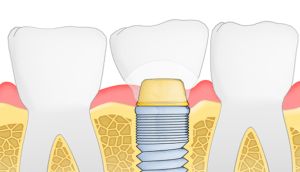Are there problems with teeth implants?
All surgery carries with it some risk, and teeth implants are no different
Teeth implants (a.k.a. dental implants) are biocompatible metal screws, surgically placed at the site of the missing tooth root. Over the years various metals have been used in the making of dental implants, and now most implants are made from biocompatible material. This means the risk of your body rejecting the foreign material is minimal, and the success rate for implant placement is above 95%.
Dental implants are a long term solution for replacing missing teeth. No other restorative treatment looks after the health of your smile, your jaw and your natural teeth the same way dental implant treatment does. If you maintain an optimal oral hygiene routine, you can have your dental implants for life.
Click here to read: Dental implants gone wrong
Click here to read: Implant dentistry: look after your whole mouth
 If there are problems with teeth implants, they will occur post-placement
If there are problems with teeth implants, they will occur post-placement
The placement of a dental implant depends on a number of factors. Chief among them is your oral health. If you do not have adequate jaw bone material and have gum disease these factors will need to be addressed prior to any dental implant treatment.
During your initial assessment we will assess your oral health and take x-rays to determine if you have adequate jawbone density. If on assessment you do not have adequate jawbone density we can perform bone grafting surgery.
Ideally, you should not undergo any restorative or surgical dental treatment if you are suffering from gum disease. Chronic gum disease (periodontitis) is the leading cause of adult tooth loss and can impact the success of any dental treatment.
Gum disease, missing teeth and the health of your jaw
Missing teeth can—vicariously—cause further tooth loss. When you lose a tooth, the jawbone around the root of the tooth starts to slowly dissolve, since there’s no longer the pressure to stimulate jawbone growth. Additionally, the gums around the missing tooth, while they will heal over, become more susceptible to gum disease.
Prior to dental implant placement, gum disease will need to be treated because it can contribute to perioimplantitis (essentially gum disease for dental implants). And this is the leading cause of dental implant failure. By treating gum disease before treatment, it will increase your chance of a successful treatment. It will also help make healing time more predictable.
Typically, it takes around three months for your jaw to fuse around the dental implant. This is known as osseointegration and once complete provides the support and stimulation your jaw needs to stay healthy.
Problems with teeth implants
After your dental implant treatment there are two things you must do:
- Maintain an optimal at-home oral hygiene routine
- Visit your dentist regularly
The majority of problems with dental implants appear post-treatment generally because a patient hasn’t looked after their oral health. After any restorative treatment it is imperative you visit your dentist on a regular basis so they can assess your oral health and the health of your restoration.
Since dental implants are just as susceptible to gum disease as your natural teeth you must brush twice a day, floss at least once a day and minimise the consumption of sugary foods and drinks.
If you would like to know more about the dental implant procedure, or to make an appointment at Brisbane Dental Implant Group, please contact us today.

 If there are problems with teeth implants, they will occur post-placement
If there are problems with teeth implants, they will occur post-placement


